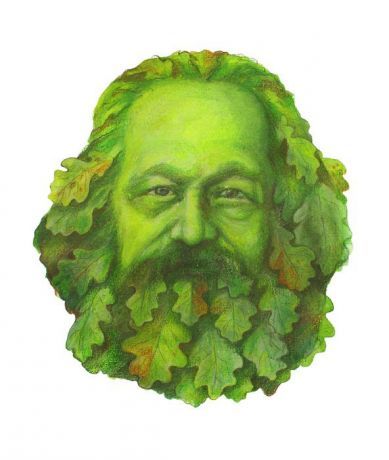Features
You are here
Das Environment: Marx, Engels and radical ecology

June 7, 2015
For today’s radicalizing climate movement, the writings of Marx and Engels still have much to offer. They explained how capitalism's insatiable search for profits was phenomenally destructive of the natural world because of how it separates human beings from nature and treats nature as something outside of us.
Far from being an uncritical proponent of the unbridled development of the forces of production (as we see in both free market capitalism and state capitalism), Marx was one of earliest and most consistent advocates of what we would today call “ecological” thinking. This thinking began early in Marx’s career and make its way into his last great work Das Kapital—in other words running from the 1840s right through to the 1860s.
Engels wrote extensively on this topic as well. He and Marx co-wrote The German Ideology in 1846, where they stated (in the male-dominated language of the time): “We know only one science, the science of history. History can be viewed from two sides: it can be divided into the history of nature and that of man. The two sides, however, are not to be seen as independent entities. As long as man has existed, nature and man have affected each other.”
Bourgeois laws
In 1842, Marx was writing for the newspaper Rheinische Zeitung. His contributions to the debates on the “Law on Thefts of Wood” were, according to his own account, an intellectual turning point in his life. These laws were by no means a minor issue. Five-sixths of all prosecutions in Prussia during this period were related to the theft of wood. At issue was the elimination of the last remaining rights of peasants in relation to what had been common lands—rights they had held since time immemorial. People traditionally held the right to collect dead wood fallen in forests for cooking and to heat their homes. The landowners denied people the right to this wood and imposed severe penalties, for what overnight was transformed into “theft.”
Marx looked at the parliamentary debate on the rights of the landlords. Nowhere were the rights of the poor discussed. According to Marx, the state, was turning ordinary citizens into “enemies of wood,” into criminals. From then on, and for the rest of his life, Marx opposed the parceling out of parts of the globe to owners of private property.
Economic and Philosophic Manuscripts and Grundrisse
Marx’s Economic and Philosophic Manuscripts of 1844 are best known for developing the concept of the alienation of labour. From the start, this concept was connected to an understanding of the alienation of human beings from nature. As Marx put it, “Man lives from nature, i.e. nature is his body, and he must maintain a continuing dialogue with it if he is not to die. … man is a part of nature.”
Under capitalism, human beings are increasingly divided into two camps: the minority of owners and controllers of property, vs the vast majority who have nothing but their ability to sell their labour in order to survive. The precondition for this was the creation of a property-less class of workers, which was dependent on transforming the human relationship to the land. This process took a number of specific historical forms. In Europe it came about through the enclosure of the commons and the displacement of the peasantry and through laws like the Law on Thefts of Wood. In the rest of the world it was the forced disposition of Indigenous land and removal of labourers through capture in slavery. In all cases, it meant the complete alienation of humans from nature.
Marx identified human labour—the capacity to apply conscious direction to shaping the elements of nature—as the thing that above all else that defines us as a species. In capitalist society, workers produce commodities through their labour, but they don't do so under their own conscious control. The capitalist determines what is produced, and under what conditions. Labour power itself is reduced to the status of a commodity, governed by the laws of supply and demand. Workers are therefore alienated from the product of their labour.
Writing in the Grundrisse in 1858, Marx alluded to the need for a coherent conceptualization of humanity’s relationship with the earth: “It is not the unity of living and active humanity with the natural…which requires explanation, … but rather the separation between these inorganic conditions of human existence and this active existence, a separation which is completely posited only in the relation of wage labour and capital.”
Das Kapital
It is in Capital that Marx uses the concept of "metabolism" to define the labour process as “a process between man and nature, a process by which man, through his own actions, mediates, regulates and controls the metabolism between himself and nature.” But an “irreparable rift” emerged in this metabolism as a result of capitalist relations of production and the antagonistic separation of town and country. This concept of metabolic rift in the relation between town and country, humans and the earth, allowed Marx to develop a critique of environmental degradation that foreshadowed modern ecological thought.
In the first volume of Capital, he wrote: “Capitalist production collects the population together in the great centres, and causes the urban population to achieve an ever-growing preponderance. This has two results. On one hand it concentrates the historical motive force of society (the working class); on the other hand, it disturbs the metabolic interaction between man and the earth, i.e. it prevents the return to the soil of its constituent elements consumed by man in the form of food and clothing; hence it hinders the operation of the eternal natural condition for the lasting fertility of the soil. . . . Capitalist production therefore only develops the technique and the degree of combination of the social process of production by simultaneously undermining the original sources of all wealth—the soil and the worker.
This concept of metabolism has a specific ecological meaning, but also a wider social meaning. It allowed Marx to express the human relationship to nature as one of both “nature imposed conditions” and the capacity of humans to affect the process.
Engels’ later work
Engels consolidated his work on nature in a series of essays taken together in The Dialectics of Nature. One of his better-known essays was entitled The Part Played by Labour in the Transition from Ape to Man, which he wrote in 1867. He noted:
“What cared the Spanish planters in Cuba, who burned down forests on the slopes of the mountains and obtained from the ashes sufficient fertiliser for one generation of very highly profitable coffee trees—what cared they that the heavy tropical rainfall afterwards washed away the unprotected upper stratum of the soil, leaving behind only bare rock! In relation to nature, as to society, the present mode of production is predominantly concerned only about the immediate, the most tangible results; and then surprise is expressed that the more remote effects of actions directed to this end turn out to be quite different.”
Conclusion
Marx denounced the destruction of nature before a modern ecological conscience was born. But he also provided a revolutionary theory that pointed a way out of false juxtapositions between humans and nature, or science and nature. He outlined the possibility of human beings working collectively under their own design, to consciously repair the rift caused under capitalism, by regaining a relationship with nature through asserting a specifically human nature — the conscious control of our labour.
Marx saw that the multifaceted, complex and rapidly accelerating destruction of the environment was traceable to the economic and social system we live in. Uprooting the system that generates unprecedented ecological destruction is also the solution to the unending cycle of wars, economic crises and oppression that we see around us today.
Join the July 4 we > tar sands events across the country, and the July 5 March for Jobs, Justice and the Climate in Toronto.
Section:










